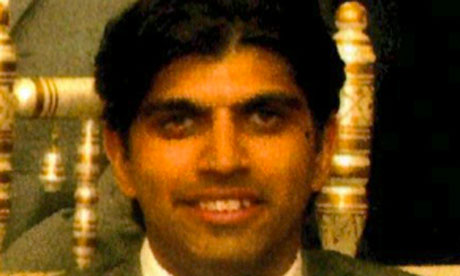
Fifteen people have been convicted of trying to steal £176m from the public purse in one of the largest and most complex mobile phone taxfrauds yet uncovered.
The case, which has involved five separate trials and concludes on Tuesday with the sentencing of a Brussels freight company owner, came to light after investigators discovered a trail of ghost companies reselling nonexistent phones.
After a three-week investigation, officers found nearly £47,000 in cash hidden in the boot of a car belonging to John McFarnon, chairman of Unique Distribution, a well-known and partly legitimate mobile distributor.
The ringleader, Dilawar Ravjani, is to serve 17 years, the longest penalty imposed for so-called carousel fraud, after masterminding the attempt to illegally reclaim millions of pounds in VAT payments from HM Revenue & Customs (HMRC).
Investigators were alerted after they discovered the gang had been claiming to trade phones made by Sony Ericsson and Samsung which, although they had been unveiled in promotional campaigns, were not yet on sale. The gang pretended to have sold more than 4m mobiles phones worth £1.7bn, most of which never existed. It is thought a further 50 companies, some of them established distributors, may have been linked to Ravjani's scam.
A total of £170,000 in cash was found during the clampdown, codenamed Operation Inertia, including £80,000 stuffed into drawers at one of Ravjani's companies, Future Communications, which investigators believe was to be used to pay off accomplices at other companies.
"This is one of the largest carousel frauds we have done," said the HMRC criminal investigations director, Donald Toon. "The people who run these scams aren't isolated individuals. Some of them are professional major fraudsters and it's a massively international game."
One of those convicted, John Conroy, found to be a covert backer of the scam and a shadow director of Unique, was resident in Marbella in Spain. Future's finance director, Zafar Chisthi, fled to Pakistan before his trial. He was sentenced in his absence to serve 11 years and remains in hiding.
The transgressions took place over just eight months. The companies involved, based in Stanmore in Middlesex and Abingdon in Oxfordshire, hoped to siphon a maximum amount in monthly VAT repayments before tax inspectors caught up with the scam.
The false trades are believed to have begun with a ghost company based in the UK claiming to have imported thousands of phones from Belgium. Sony Ericsson had just announced its P990 handset, and the company claimed to have imported 90,000 of them. It claimed a further 96,000 Samsung Serene handsets had been brought into the UK.
But the gang had failed to spot a manufacturing delay that meant neither model had left the production line at the time. The phones passed through other "buffer" firms, before being bought by Future.
A chain of five or six ghost companies was created to muddy the waters. More than 5,700 individual trades were recorded, some taking just a day to pass through the entire chain. Future, at the end of the chain, would then claim to have sold the phones to a ghost company in Europe.
Because companies cannot claim the cost of VAT payments back from their European counterparts, the UK tax authorities reimburse VAT on any items bought in the UK but sold abroad. This is done in order to encourage exports.
However, following a clampdown on VAT repayments where the first company in the chain has gone missing, Future was unable to make its false claims and forced to change tack. It then began importing the phones itself, and selling them on to its sister company Unique and as many as 50 other distributors, both real and shell companies. Unique would then sell the phones to a European company and claim the tax back.
The scam also involved two freight companies, A1 Freight in Staffordshire and Boston Freight in Belgium. Vans shuttled across the channel, generating documents to prove goods had crossed borders.
When investigators raided Boston Freight, they found three vans loaded with pallets of phones, but the handsets in questions were low-value devices, which they believe may have been dummy cargoes designed to throw customs off the scent. The high-end Sony and Samsung devices shown on the paperwork were never found.
Three successful VAT repayment claims were made from November 2005 to June 2006, totalling £107m, before the fraud was stopped. The money, which officers are attempting to claw back, was laundered through offshore bank accounts, property and car companies. Future had attempted to claim a total of £176m.
Investigators' suspicions were confirmed when they discovered Unique had, during the eight months in question, declared eye-catchingly large sales of £2.2bn but paid a total of £17.74 in VAT.
When Unique's offices were raided, they found a majority of staff working on low value but legitimate trades such as reselling airtime, while a small team were employed generating the bulk of the company's income from the carousel fraud.
"This was theft from the taxpayer," said Toon. "It fundamentally undermines the UK tax base and that's why the enforcement response is so critical."
Marshall Boston of Boston Freight is due to be sentenced at Kingston crown court on Tuesday .


















1 comments:
DILAWAR RAVJANI is one of the biggest VAT Fraudster who is involved with Fifteen people have been convicted of trying to steal £176m from the public purse in one of the largest and most complex mobile phone taxfrauds yet uncovered. But Imran Hussain is one of the biggest VAT fraudster. He alleged for £300M. Imran Hussain Vat Fraud Case is one of biggest Fraud history of UK Government.
Post a Comment